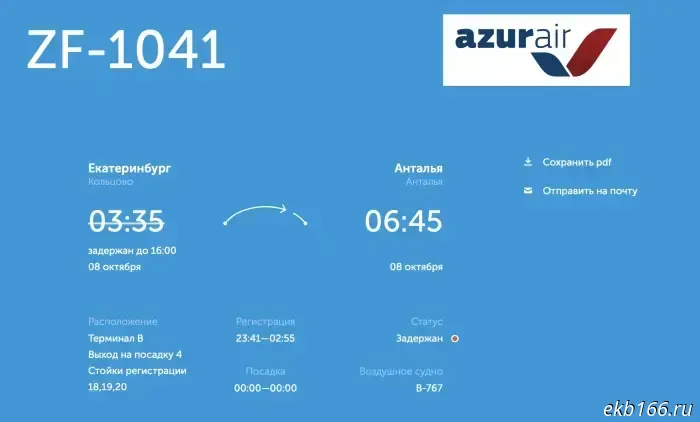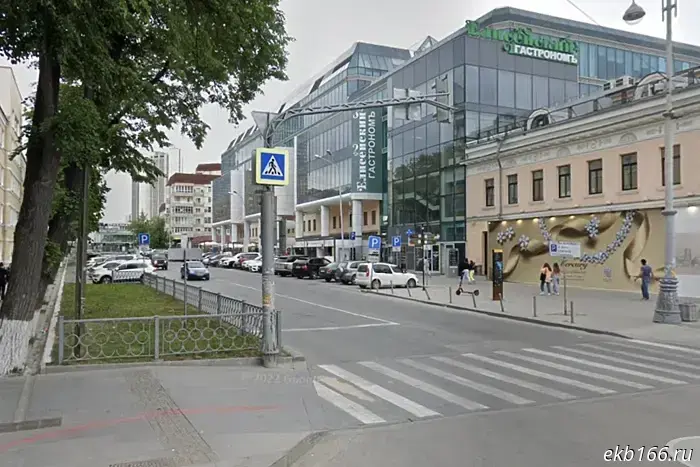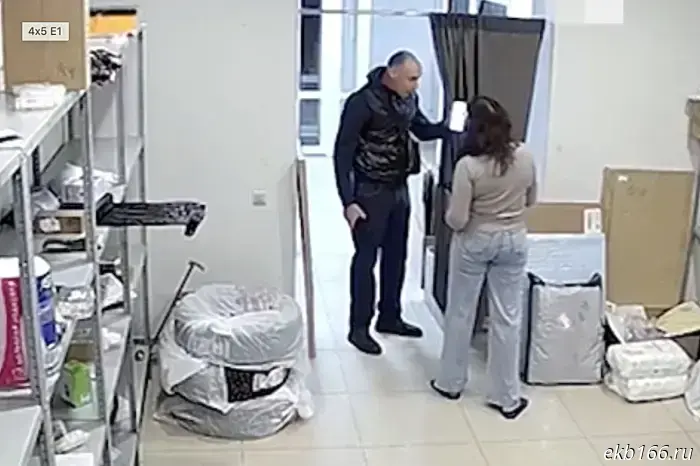
Разозленные жители Свердловской области не могут вылететь на отдых в Турцию из аэропорта Кольцово.
В аэропорту Кольцово вылет рейса в Анталью задерживается уже более 12 часов. В зале ожидания скопилось множество раздражённых пассажиров.
Согласно информации на онлайн-табло, самолёт рейса ZF-1041 должен был отправиться на турецкий курорт в 3:35, но вылет перенесли на 16:00 8 октября.
— Рейс задержали, сказали, что что-то починили, — рассказал один из читателей E1.RU.
По словам пассажирки Ирины, людям не предоставили питание, гостиницы также не предложили — выдали только воду.
— Представитель сообщил, что у самолёта сломался закрылок, деталь вроде как везут из Москвы, — добавила она. — Сначала два часа просидели в самолёте, затем нас вернули в аэропорт. Никакой информации нет, отеля не предоставляют. Дети утомились, взрослые раздражены, — поделился ещё один путешественник.
По оценкам пассажиров, в ожидании вылета находятся более 300 человек. Связаться с пресс-службой авиакомпании Azur Air, осуществляющей рейс, оперативно не удалось.


Другие Новости Екатеринбурга (ЕКБ166)
 Жители Свердловской области массово обращаются с жалобами на отсутствие мобильного интернета.
Жители Екатеринбурга и окрестных пригородов активно сообщают о проблемах с мобильным интернетом у клиентов оператора «Мотив». Первые жалобы на сбои начали поступать примерно в 11:00 8 октября.
Жители Свердловской области массово обращаются с жалобами на отсутствие мобильного интернета.
Жители Екатеринбурга и окрестных пригородов активно сообщают о проблемах с мобильным интернетом у клиентов оператора «Мотив». Первые жалобы на сбои начали поступать примерно в 11:00 8 октября.
 На ещё одной улице в центре Екатеринбурга будет запрещена парковка.
В Екатеринбурге на трёх дополнительных участках улиц запретят парковку. В ближайшее время там установят соответствующие знаки, и будут действовать эвакуаторы, сообщили в мэрии. Теперь оставлять машину нельзя будет на: - улице Вайнера (от Антона Валека до проспекта Ленина); - всей улице Алданской; - улице Завокзальной (от здания № 5 до Армавирской).
На ещё одной улице в центре Екатеринбурга будет запрещена парковка.
В Екатеринбурге на трёх дополнительных участках улиц запретят парковку. В ближайшее время там установят соответствующие знаки, и будут действовать эвакуаторы, сообщили в мэрии. Теперь оставлять машину нельзя будет на: - улице Вайнера (от Антона Валека до проспекта Ленина); - всей улице Алданской; - улице Завокзальной (от здания № 5 до Армавирской).
 В Екатеринбурге в центре города произошел инцидент с участием Lamborghini.
В центре Екатеринбурга случилась авария с участием дорогих автомобилей. На улице 8 Марта произошло столкновение Lamborghini Huracan Tecnica и кроссовера Mercedes. В результате ДТП движение на этом участке временно ограничили, к счастью, никто не пострадал.
Власти Свердловской области прокомментировали эвакуацию предприятий в этом регионе.
Некоторые предприятия Свердловской области начали применять превентивные меры в ответ на угрозу атаки беспилотников, что включает в себя эвакуацию сотрудников. В каждом учреждении разработан индивидуальный план действий для таких случаев.
В Екатеринбурге в центре города произошел инцидент с участием Lamborghini.
В центре Екатеринбурга случилась авария с участием дорогих автомобилей. На улице 8 Марта произошло столкновение Lamborghini Huracan Tecnica и кроссовера Mercedes. В результате ДТП движение на этом участке временно ограничили, к счастью, никто не пострадал.
Власти Свердловской области прокомментировали эвакуацию предприятий в этом регионе.
Некоторые предприятия Свердловской области начали применять превентивные меры в ответ на угрозу атаки беспилотников, что включает в себя эвакуацию сотрудников. В каждом учреждении разработан индивидуальный план действий для таких случаев.
 Коллектив кардиоцентра попросил отменить решение об отставке известного главного врача Яна Габинского.
Заместитель губернатора и министр здравоохранения Свердловской области Татьяна Савинова посетила Уральский институт кардиологии, где накануне главный врач Ян Габинский был освобождён от своей должности.
Коллектив кардиоцентра попросил отменить решение об отставке известного главного врача Яна Габинского.
Заместитель губернатора и министр здравоохранения Свердловской области Татьяна Савинова посетила Уральский институт кардиологии, где накануне главный врач Ян Габинский был освобождён от своей должности.
 В Екатеринбурге неизвестный довел работницу Ozon до слез из-за патчей для глаз.
В Екатеринбурге мужчина разразился скандалом в пункте выдачи заказов из-за патчей для глаз. Причиной его агрессивного поведения стала неуспешная попытка его девушки произвести оплату заказа.
В Екатеринбурге неизвестный довел работницу Ozon до слез из-за патчей для глаз.
В Екатеринбурге мужчина разразился скандалом в пункте выдачи заказов из-за патчей для глаз. Причиной его агрессивного поведения стала неуспешная попытка его девушки произвести оплату заказа.
Разозленные жители Свердловской области не могут вылететь на отдых в Турцию из аэропорта Кольцово.
В аэропорту Кольцово вылет рейса в Анталью уже задерживается более 12 часов. В зале ожидания скопилось множество раздражённых пассажиров. По информации с онлайн-табло, самолёт рейса ZF-1041 должен был отправиться на турецкий курорт в 3:35, но вылет перенесли на 16:00 8 октября.
